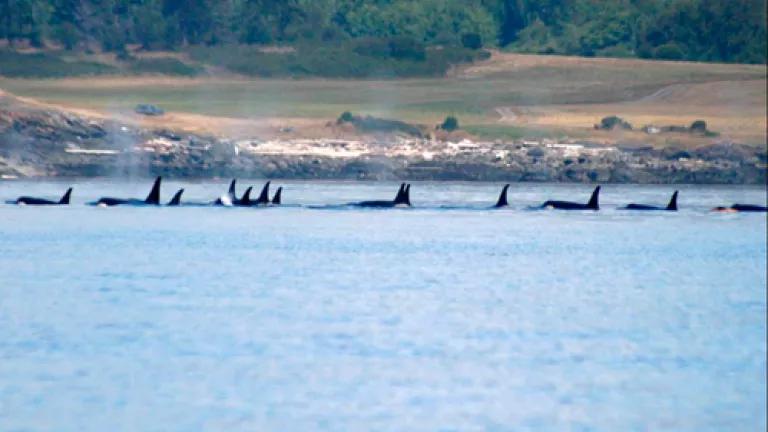This Week in Whales: How Human Activity Is "Blinding" Whales; SeaWorld Gets Sad Face as "Blackfish" Hits Theatres; New Threat Rankings for Marine Mammals...

News in the world of whales this week (or close to it):
- My colleague Michael Jasny appeared on NPR to discuss the harmful impacts of ocean noise pollution on marine mammals, who rely on sound to communicate, mate, forage, and avoid predators. In short, the surge in underwater noise in the past 150 years due to commercial shipping, seismic surveys for oil and gas, and navy sonar exercises has, in many instances, rendered marine mammals essentially blind. In June, NRDC reached a settlement that requires the oil and gas industry to mitigate the harmful effects of seismic surveys and use less invasive forms of exploration around whale and dolphin habitat in the Gulf of Mexico.
- The recently released documentary "Blackfish" uncovers the dark underbelly of SeaWorld and the captive orcas who perform there. The death of veteran trainer Dawn Branchea--who was pulled underwater and drowned by the 12,000 pound orca Tilikum--instigated Cowperthwaite's investigation, which took three years to complete. She compiled footage from local and national news outlets, SeaWorld visitors' personal archives, and Freedom of Information Act requests. She interveiwed park visitors, animal behavior experts, and retired SeaWorld trainers to paint an evocative picture of the gruesome lives of captive orcas ripped from their families, kept in tiny enclosures, and forced to perform tricks for their meals. As SeaWorld continues to come under fire for allegations of animal cruelty (and rightfully so), a new video of a struggling pilot whale was recently uploaded to YouTube, capturing the shock of spectators.
- A recent study by ecologists at the University of Tennessee creates a statistical model to predict "threat rankings" across 125 species of marine mammals (including some "data deficient" marine mammal species, for which there hasn't been enough data to create predictive models in the past). The authors believe one way to help protect these threatened species is the creation of more Marine Protected Areas, and their modeling, with its identification of "hot spots" should help.
- Divers caught in the middle of a humpback feeding frenzy off the coast of California managed to videotape the encounter, which has since gone viral on YouTube. You can find more videos on humpback whales' sophisticated hunting mechanisms, such as their "bubble nets," here.
Meanwhile, this week in Wales...
World Cup-winning coach Sir Clive Woodward predicts that Wales will win the Rugby World Cup in 2015!
Photo credit: NOAA

